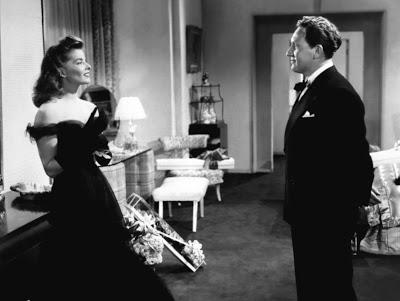Format: DVD from Sycamore Public Library on laptop.

When you think of great screen couples from the golden age of Hollywood, Spencer Tracy and Katharine Hepburn. The two had magnificent chemistry together both on and off screen, which made them a natural pairing. Their typical film was light romantic comedy and Woman of the Year is no different in that respect. In many respects, this explores the same territory as a lot of other Tracy/Hepburn films: the sexual politics of the day.
It also feels in many ways like the beginnings of what would become a modern sitcom situation. One of the conceits of many a sitcom, at least in the past, is putting a man in a relationship with a woman who is far too smart, accomplished, and good for him. This is close to the territory we’re treading here, although not entirely. What we’ll find as we dig into the story here is that she may well be too smart and accomplished for him, but he may be too good for her.
Tess Harding (Hepburn) works at a New York newspaper, writing a column on important world events. She has personal relationship with any number of heads of state, speaks multiple languages fluently, and seems to hold all of the right opinions and answers on every world problem. Sam Craig (Tracy) is a sports columnist at the same paper. The two have never met and she has no knowledge of the existence of Sam Craig, but he knows all about her because of her frequent appearances on radio panels and the like. When, during one such panel, she announces that the U.S. should give up baseball for the duration of the war, Sam writes a frosty column that calls her out. She responds in kind. Before this gets out of hand, the pair are told to make up by the editor. There is an initial attraction, and Sam invites her to a baseball game to help her understand what she may have been missing.
There wouldn’t be much of a movie here if the two didn’t quickly fall hard for each other, so they do. This is a stretch for Sam, though, because Tess really does know everyone and has her hands in a lot of pies and a lot of issues. They don’t get much time together because she is constantly being pulled away for meetings with foreign dignitaries or having those dignitaries show up at her house. Eventually, the two do get married, but even their wedding night is partially spoiled by the arrival of a foreign dissident named Dr. Lubbeck (Ludwig Stossel). Sam deals with this as well as he can, but becomes increasingly frustrated with Tess’s tendency to treat him like a servant and an accessory rather than as a husband.
Things come to a head around a couple of important events. First, Tess takes charge of a young Greek refugee named Chris (George Kezas) without first consulting Sam. Since Chris does not speak any English and Sam doesn’t speak any Greek, the two have little to talk about. Chris seems little more than a trophy for Tess, who is uninterested in taking care of the boy. The second event comes when Tess is awarded America’s Outstanding Woman of the Year and plans to leave the six-year-old Chris alone in her apartment during the ceremony. Sam decides not to go to stay with Chris, telling Tess to say he had something more important to do that night. She scoffs at this, saying no one would believe that he had something better to do. With that, Sam takes Chris back to the orphanage and returns to his own apartment.
Of course, the rest of the film is going to concern getting these two back together, and this is where the film comes close to failing for me. There’s a great deal of 1940s gender politics toward the end of the film and it comes close to rescuing itself by shying away from demanding that Tess give up everything she’s worked for and cares about to take care of her new husband. It flirts with that idea and may even come close to it, but doesn’t go all the way there. It’s at least a start and I’d have been surprised at much more from a 1942 film, but it’s decidedly aged by today’s standards.
Woman of the Year is greatly helped by a few solid supporting turns. Fay Bainter plays Ellen Whitcomb, Tess’s aunt who raised her. Ellen comes across as sympathetic and warm rather than the passionate but personally cold demeanor of Tess. I tend to like Fay Bainter in general, and was pleased to see her here. Also good in support are Minor Watson as Tess’s father and William Bendix as a bar-owning former boxer named “Pinkie” Peters. Dan Tobin playing Tess’s uber-efficient male secretary rounds out the cast.
There are interesting ideas at work here, ones that would be explored in other Tracy/Hepburn light comedies like Adam’s Rib and by other stars in films like Designing Woman. It’s impossible not to see this as a product of its time because we’ve moved beyond the point where women are assumed to have only a family and home as a goal and everything else is a smaller priority. That aspect of the film no longer works. What does work is the continuing and wonderful chemistry between Spencer Tracy and Katharine Hepburn, who were always perfectly matched on camera.
Why to watch Woman of the Year: Tracy and Hepburn always had great chemistry.
Why not to watch: As often happens in older films, the sexual politics shows its age.
